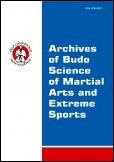2021, Volume 17, Issue 1
Coronavirus COVID-19 transmission level among employees and students of the Podhale State College of Applied Sciences in Nowy Targ
Jarosław Klimczak1, Piotr Kurzeja2, Bartłomiej Gąsienica Walczak3, Katarzyna Ogrodzka-Ciechanowicz4
1Department of Tourism and Recreation, University of Warmia and Mazury in Olsztyn, Olsztyn, Poland
2Health Institute, Podhale State College of Applied Sciences, Nowy Targ, Poland
3Health Institute, Podhale State College of Applied Sciences, Nowy Targ, Poland
4Institute of Clinical Rehabilitation, Faculty of Motor Rehabilitation, University of Physical Education, Kraków, Poland
Author for correspondence: Bartłomiej Gąsienica Walczak; Health Institute, Podhale State College of Applied Sciences, Nowy Targ, Poland
Full text
Abstract
Background & Study Aim: Healthcare systems in all countries are maximizing efforts to mitigate the spread and mortality of COVID-19. Universities are one of the places where the spread of the virus has significantly limited it. Preventing the transmission of SARS-CoV-2 in higher education institutions presents a unique challenge due to the presence of collective living conditions and the difficulties in limiting socialization and group meetings. The aim of the research is to know about the level of COVID-19 coronavirus transmission among employees and students of the Podhale State College of Applied Sciences in Nowy Targ (PSCAS).
Material & Methods: The study used data on COVID-19 transmission among employees and students of the PSCAS in the period from October 26, 2020 to July 4, 2021. Secondary analysis of existing data was used for the research.
Results: During the entire observation period, 32 people were infected, which constitutes 12.8% of this occupational group. On the other hand, 153 people (academic teachers), i.e. 61.2% of all employees, were in quarantine or self-isolation. Among the students, 11 were infected (0.55%), and 28 students were in quarantine or self-isolation, representing 1.9% of all students.
Conclusions: The introduction of the sanitary regime and the organization of all classes in the remote system contributed to the gradual reduction in the transmission of coronavirus among employees and students of PSCAS. These activities were of great importance for the protection of the health and life of the entire academic community. The strategies for dealing with the pandemic developed by the University authorities effectively minimized the risk of infections in PSCAS, and thus not only employees and students, but also their families and closest friends were secured.
Key words: infections, pandemics, quarantine, universities, vaccination





